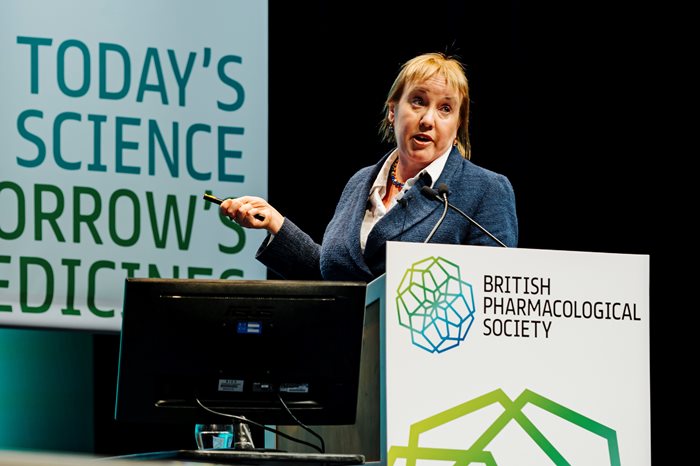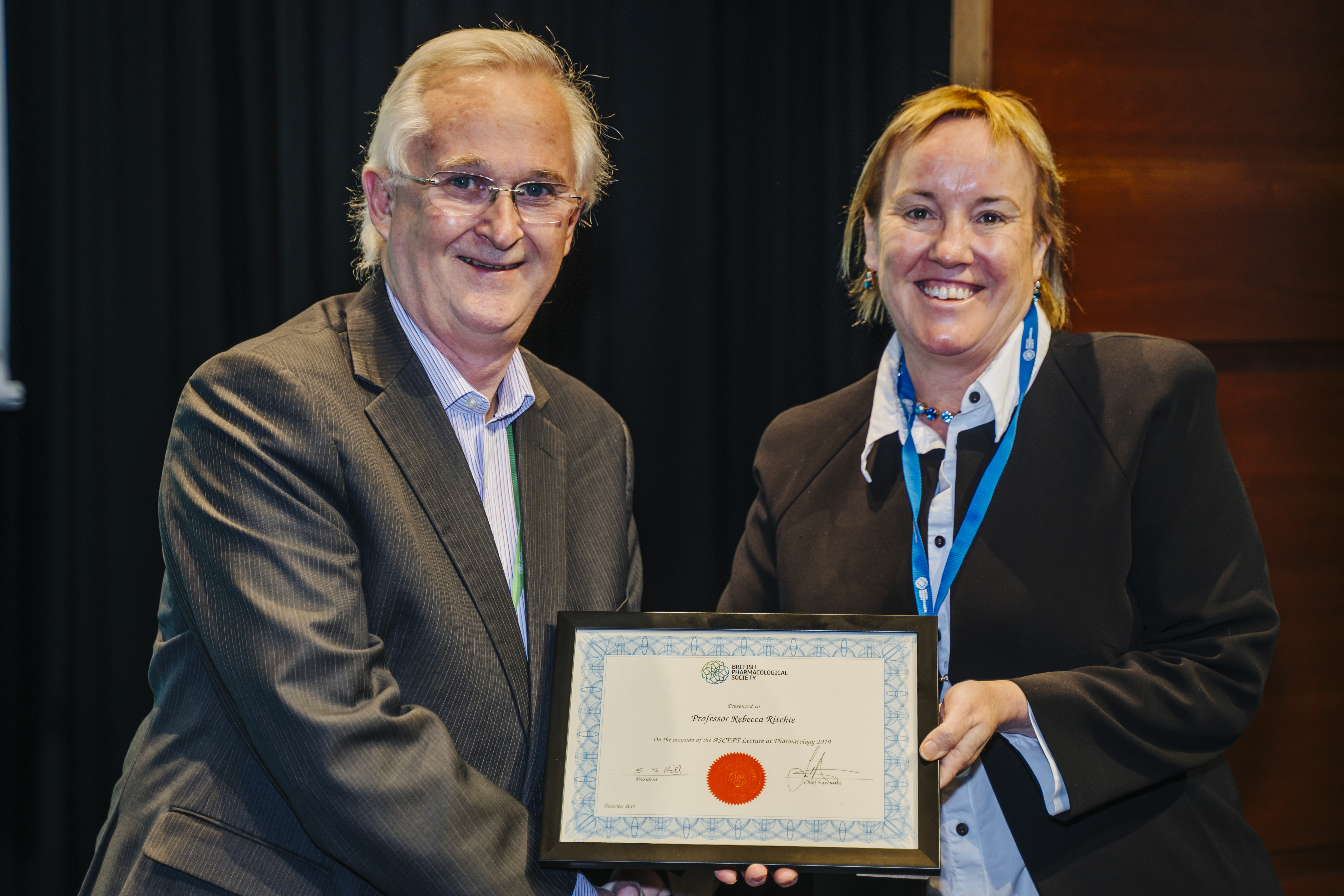Hello Professor Rebecca Ritchie, and welcome to Pharmacologist in Phrame!

What is your background and career pathway to date?
I did a Bachelor of Science with Honours at the University of Adelaide in Australia, before undertaking a PhD at the University’s Department of Medicine (Cardiology) under the supervision of Professor John Horowitz. My PhD focused on predictors of myocardial function in vivo in patients with coronary heart disease, including the development of the first quantitative model of force–interval relationship in human myocardium. In 1995, I started my postdoctoral training at Wayne State University in the USA under the mentorship of Professor James Marsh in the Program of Molecular and Cellular Cardiology. In 1997, I returned to Melbourne at the Howard Florey Institute to work with Professor Greg Dusting and then, later in 2002, I joined the Baker Heart and Diabetes Institute, where I progressed to becoming an independent principal investigator (PI). I was an NHMRC Senior Research Fellow and Head of the Heart Failure Laboratory. I’ve recently started a new role as Theme Leader of the Drug Discovery Biology Theme in the Monash Institute of Pharmaceutical Sciences.
Why did you decide to pursue an academic career?
I knew as early as my second-last year of high school that I wanted to do a PhD, to find new drugs for curing diseases. As I progressed through my PhD, I had a strong desire to follow my own ideas (rightly or wrongly), rather than working on someone else’s. I was fortunate enough to secure funding for my academic career through peer-reviewed grants and fellowships, which made my dream possible. My recent position is funded by the university, and at the age of 50, it is the first time my salary is not from grants.
What would be your advice in terms of scoring independent funding for future generations of scientists?
It is difficult for me to comment, as the landscape has suddenly changed quite dramatically, especially in Australia in the recent year. I advise that every scientist should be (1) clear about their role and responsibilities in specific projects, in relation to publications, and (2) involved in various projects as well as main projects to be able to yield various main and middle authors’ papers, and when appropriate, seize the opportunity to be the corresponding author.
What did you enjoy the most during your PhD?
There are a lot of things I enjoyed while doing my PhD. My project focused on understanding myocardial drug uptake in human hearts in vivo. My experiments were designed to understand the pharmacodynamics and pharmacokinetics of various drugs, which can be applied to patients with ischemic heart disease. At that time, I was the only researcher working on this model which was exciting and I strongly believed that it would have a big impact on our understanding of cardio-active drugs.
What research are you currently working on?
My lab essentially focuses on identifying new ways of treating heart failure. 75% of my work concentrates on understanding the pathogenesis of heart failure resulting from diabetes and the other 25% on heart failure resulting from myocardial infarction. Our experimental models are mainly long term in vivo animal models and we rely on in vitro experiments to trace mechanisms using primary cells, commercially available cell lines and IPSC-derived cardiomyocytes. Samples such as atrial tissues collected from patients undergoing coronary bypass surgery and diabetic patients with heart failure allow us to conduct proof-of-concept studies.
What does your typical work look like?
I have to attend a lot of meetings! In my new role as head of department, I attend various lab meetings with different groups in the department to learn about the research being conducted. Additionally, I attend quite a few meetings within the institute in relation to the strategic direction of our faculty. The department consists of about 120 members and I am directly involved in various administrative tasks, which include approving grant applications, holiday leave, contract changes and renewal and expenses, among other tasks. Lastly, I have to keep my own research progressing by managing my team. I do miss the days as a PhD student and postdoctoral research where I was able to conduct work in the wet labs. Now I mostly design the projects, supervise my team and see the end products.
What would you advise in terms of supervision to the new generation of PIs?
Over the years, I have learned to not assume that everyone works the same way, because each individual is motivated by various things. While some people (junior or senior) see a given research post as a job, others will see it as a career and hence, the dynamic of work patterns and their passion may vary. I recommend attending a leadership training programme especially aimed at early- to mid-career scientists. Having a good team who can work together is very important. While everyone has their own project, every now and then, when needed, they can also come together to contribute to a big project, which in the end benefits everyone in terms of learning new skills, team bonding and increasing publications. It can be difficult when you have a big group and you have to deal with different personalities. I like to encourage diversity as well as choosing and establishing a team who can work together.
What are you looking forward to in terms of research?
One of the things I really enjoy is seeing my students progress from an undergraduate degree to an amazing PhD, then later on a postdoctoral position, internally or externally. There is someone in my group right now who has progressed to starting up her own lab as an independent PI, through the award of a fellowship. I am very proud of her and it is successes like these that keep me going.
Which outreach activities do you engage in?
I enjoy talking about my research to a lay audience, as I find it quite rewarding. Earlier in my career (i.e. 10 years post my PhD), I spent lots of time visiting high school students to talk about careers in science, engineering or medicine, depending on which area the school was interested in. I have also spoken a few times to community groups in Australia. We have an umbrella organisation in Australia called Science and Technology Australia, which consists of 70 scientific bodies. I am a board member of this organisation and am frequently involved in public-engagement activities, such as interactions with politicians, and am active in social media and engagement with various STEM-related matters.
How would you choose a mentor and what are on your thoughts on mentorship?
I strongly believe in mentorship and I’ve had a few mentors advised and supported me on different things and have contributed to changes I made in my career. I believe that a mentor does not have to be in your workplace or associated with your field of research. It is also important to realise that a mentor and a supervisor are different. While a supervisor can mentor you, a true mentor has no agenda and is not directly linked to the progression of your own work.
.jpg.aspx?width=700&height=466)
Professor Rebecca Ritchie receving the ASCEPT Prize Lecture award at Pharmacology 2019
What has been your biggest career achievement so far?
When we discovered that an agonist binds to a particular receptor family and induces its protective effects. For me, this is a defining moment in my work as a scientist that I can always think of and it brings a smile to my face. The other scientific achievement is the set of work I presented at my Prize Lecture at Pharmacology 2019 in Edinburgh, showing how we can manipulate the cardiac phenotype in terms of cardiac morphology and function. As a PhD student, I frequently attended national meetings organised by the British Pharmacological Society and always wished I would be standing on stage as a Prize Lecture Winner one day. For this to final happen is amazing and one of my big scientific achievements.
What do you enjoy doing outside work?
I enjoy cooking and am a lover of wine, so we frequently do wine tasting. In January 2019, I got a puppy as a birthday present, which I am obsessed with and cannot stop talking about with my members of my team.
.jpg.aspx?width=750&height=562) Bari, an adorable Bernese Mountain Dog
Bari, an adorable Bernese Mountain Dog
What are your top tips for networking?
It is very important to come along to network events and/or conferences. These informal networking sessions provide a platform where you can meet many scientists, including senior members of the society and this allows you to discuss your area of research which can lead to collaborations and various job offers or other opportunities such as speaker invitations. Don’t hesitate to approach senior scientists! Most PIs are approachable and are happy to help early-career scientists.
Who do you look up to academically?
There are so many people, such as Professor Arthur Christopoulos, Professor Patrick Sexton, Professor Adrian Hobbs and Professor Amrita Ahluwalia.
How would you like to be remembered?
I'd like to be remembered as someone really passionate about their work but also inclusive and supportive in training the next generation of scientists, so that they can provide a similar (or better) support for the next generation.
Rapid-fire round with Rebecca
- Favourite movie? Love Actually
- Favourite scientist? Professor Arthur Christopoulos
- Sweet or savoury? Savoury
- Coffee or red wine? Depends on what time of day or night
- Night in or night out? Night out
- In vitro or In vivo? In vivo
- Australia or UK? Well it depends! Are you talking work or pleasure?
Comments
If you are a British Pharmacological Society member, please
sign in to post comments.